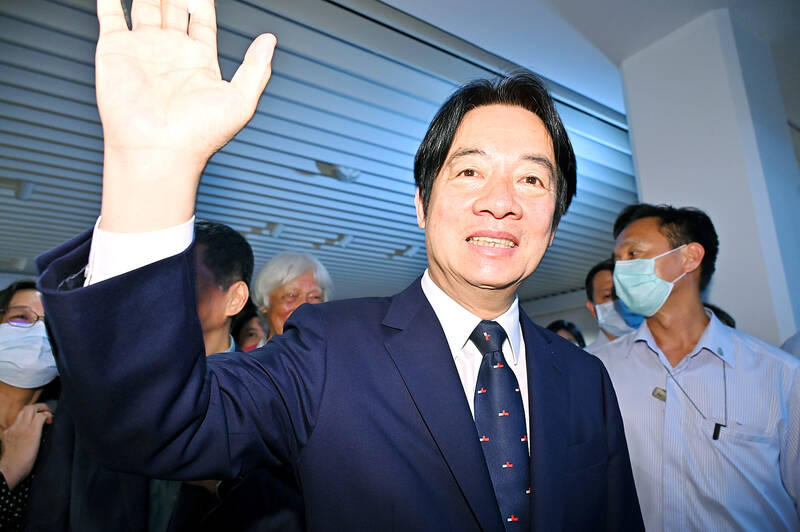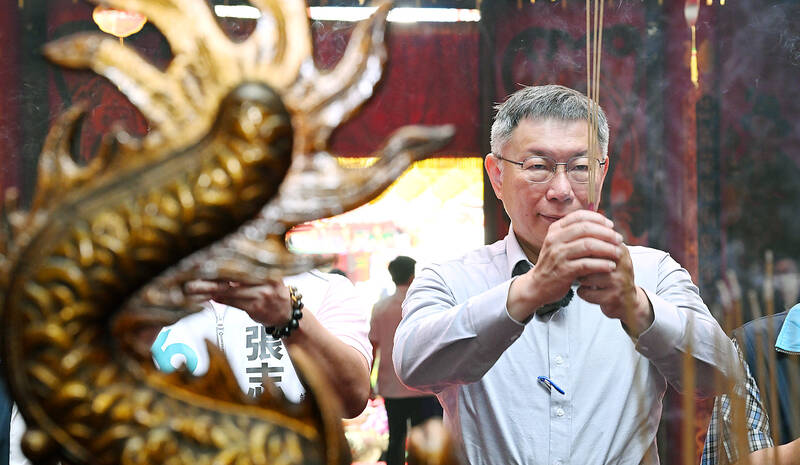It’s certainly been a pleasure watching the presidential campaign launch of Chinese Nationalist Party (KMT) candidate Hou You-yi (侯友宜) lurch painfully about like a wounded pachyderm in search of an elephant graveyard. Hou’s fall to third place in some polls last week appears early, and it might still be recoverable. But grumbling in his party about replacing him has already begun.
Indeed, all indications are that the party that twice gave us Lien Chan (連戰), the most despised politician in Taiwan, as a presidential candidate and later offered voters Hung Hsiu-chu (洪秀柱) and Han Kuo-yu (韓國瑜), is arcing along its normal descending trajectory, the North Korean missile test of electoral politics.
A KIND OF POLICY PLATFORM

Photo: Tu Chien-jung, Taipei Times
Last week the KMT doubled down on this path with Hou’s calls for nuclear power and more death penalty executions, standard KMT fare for decades (the latter is unnecessary since so many potential criminals are likely to die in traffic accidents long before they harm anyone). Apparently KMT policy institutions are not echo chambers so much as mausoleums where dead ideas are embalmed and then periodically put on display.
The lack of public policy imagination is obvious. A less obvious facet of KMT ineptitude: with years of speculation that Hou would be their man in 2024, neither Hou nor the party insisted on interesting or experimental public policies to showcase Hou’s greatness in preparation for the showdown.
Of course, that is even more true of the Democratic Progressive Party (DPP). Hou’s slide and the media buzz surrounding it are obscuring the truly urgent problem the pro-Taiwan side faces: DPP presidential candidate William Lai (賴清德) has not expanded his voter support beyond the party base. In most polls he remains below 40 percent.

Photo: Chueh Ching-lun, Taipei Times
Independent voters are staying away in droves, and for the moment the young are turning to Ko Wen-je (柯文哲), the Taiwan People’s Party (TPP) founder and presidential candidate. As long as there are three viable candidates in the race, Lai will probably win.
What should the DPP be doing? As polls show, the party’s cross-strait and foreign policies have strong public support. Clearly its weaknesses are on the domestic front. The youth turn to Ko should be viewed as an opportunity: they, and the electorate, can be won with straight talk, numbers and progressive domestic policy proposals.
Back in 2013 Dongtao Qi of the National University of Singapore explained in the China Quarterly that the DPP’s recovery in the 2012 election rested on the twin pillars of Taiwan nationalism and social justice.

Photo: Liao Chen-huei, Taipei Times
He cites survey data from 2008 showing that “nearly half of all people surveyed believed that the KMT represented the interests of the rich and powerful, while 51.1 per cent believed that the DPP represented the ordinary person.”
How many would say that today?
He supported that with an analysis showing that “even after controlling for Taiwanese nationalist sentiment, the less privileged Taiwanese were still significantly more likely to vote for the DPP in 2004, 2008 and 2012.”
DISAPPEARING MIDDLE CLASS
A decade ago class trends showed where Taiwan was heading. Since the early 1990s the number of people in Taiwan identifying themselves as middle class has fallen from around 40 percent to around 25 percent, while the number of people identifying as lower middle class has risen from 15 percent to over 20 percent over the same period.
“This ought to signal to the DPP that an overtly social justice platform can win them more votes.” I wrote that back in 2014. It’s still true today, even more so.
Every election the DPP offers a social justice headfake while pretending to bounce pass to the laboring classes. Then, in office, it’s back to hogging the ball til time runs out on behalf of business. That kind of cynical campaigning worked in the past because there were only two parties, the other was far worse, and the DPP could rely on Taiwanese nationalism to generate votes. Now the TPP, which is still working out its identity, exists as an alternative.
As social scientists have noted for decades, the working class and the small business class in Taiwan used to be two parts of the same whole. As Hill Gates wrote in her 1988 book Chinese Working Class Lives: Getting by in Taiwan: “there is no real division between Taiwan’s industrious small business people and its industrial workers.”
Indeed, one transitioned into the other as part of their life cycle: small factory workers were essentially small factory and small business owners in larval form.
Scholars have documented that in early elections, the pro-democracy side drew its strength from this class and farmers. As individuals upclassed into the urban proletariat, they became more conservative.
NATIVIST REVOLT?
Now this working class is larger than it has been for decades, and in much worse economic straits. Recent media reports have indicated that the DPP fears it could swing to the right. The party has elected to run progressive politicians at the local level to counter this. This is to its credit.
As I observed in this column on April 25 last year, the economic stagnation of the working class implies vulnerability to a populist revolt. At present none of the candidates outside the DPP offers the kind of charismatic appeals to ethnonationalism and economic populism that could spark such a social movement.
At present, would-be populists in the pan-Blue camp are hampered by its cross-strait policies and that camp’s contempt for Taiwanese culture and Taiwaneseness.
But the potential exists.
The DPP’s cynical manipulation of social justice has to end. The party must sincerely position itself as the progressive party, not merely as a party with progressive politicians in it. It must come out with policies that meaningfully tax the rich and reinvest that in innovation, green technology and infrastructure. It must do that because that will win elections, and because that will help head off a nativist populist storm that could break over Taiwan, if only it could find the right figurehead for it.
It’s not just for China that a DPP win is a national security issue.
Notes from Central Taiwan is a column written by long-term resident Michael Turton, who provides incisive commentary informed by three decades of living in and writing about his adoptive country. The views expressed here are his own.

Towering high above Taiwan’s capital city at 508 meters, Taipei 101 dominates the skyline. The earthquake-proof skyscraper of steel and glass has captured the imagination of professional rock climber Alex Honnold for more than a decade. Tomorrow morning, he will climb it in his signature free solo style — without ropes or protective equipment. And Netflix will broadcast it — live. The event’s announcement has drawn both excitement and trepidation, as well as some concerns over the ethical implications of attempting such a high-risk endeavor on live broadcast. Many have questioned Honnold’s desire to continues his free-solo climbs now that he’s a

As Taiwan’s second most populous city, Taichung looms large in the electoral map. Taiwanese political commentators describe it — along with neighboring Changhua County — as Taiwan’s “swing states” (搖擺州), which is a curious direct borrowing from American election terminology. In the early post-Martial Law era, Taichung was referred to as a “desert of democracy” because while the Democratic Progressive Party (DPP) was winning elections in the north and south, Taichung remained staunchly loyal to the Chinese Nationalist Party (KMT). That changed over time, but in both Changhua and Taichung, the DPP still suffers from a “one-term curse,” with the

Jan. 26 to Feb. 1 Nearly 90 years after it was last recorded, the Basay language was taught in a classroom for the first time in September last year. Over the following three months, students learned its sounds along with the customs and folktales of the Ketagalan people, who once spoke it across northern Taiwan. Although each Ketagalan settlement had its own language, Basay functioned as a common trade language. By the late 19th century, it had largely fallen out of daily use as speakers shifted to Hoklo (commonly known as Taiwanese), surviving only in fragments remembered by the elderly. In

Lines between cop and criminal get murky in Joe Carnahan’s The Rip, a crime thriller set across one foggy Miami night, starring Matt Damon and Ben Affleck. Damon and Affleck, of course, are so closely associated with Boston — most recently they produced the 2024 heist movie The Instigators there — that a detour to South Florida puts them, a little awkwardly, in an entirely different movie landscape. This is Miami Vice territory or Elmore Leonard Land, not Southie or The Town. In The Rip, they play Miami narcotics officers who come upon a cartel stash house that Lt. Dane Dumars (Damon)